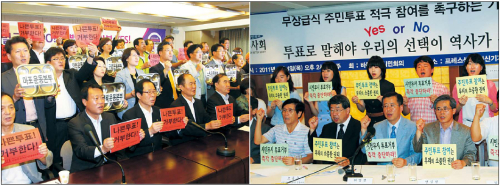Mayor Oh Se-hoon of the ruling Grand National Party and conservative groups condemn the move for free lunches for all students regardless of income as “welfare populism.” On the other hand, the council, the main opposition Democratic Party and other liberals have criticized the referendum itself.
With the debate heating up as the poll nears, local media has drawn attention to election scenarios, Oh’s future, the course of welfare policies and the impact on the political landscape.
If it passes
Oh has advocated a selective welfare ideology, which advocates providing free lunches to children from low-income families while excluding the rich. Last year, though, the DP-dominated city council passed an ordinance to require free lunches be given to all elementary and middle school students regardless of income. The ordinance soured relations between the mayor and the council in other matters as well.
If Seoul citizens vote to bring his free school lunch vision back to life, they will revive more than just the program. His other plans, thus far deterred by the council, will gain new momentum, including cutting a waterway from Incheon west of the capital, to Yeouido, southeast Seoul.
“Winning the vote will be a breakthrough for his stalled plans,” Lee Myung-hee, a Gongju University professor, told local media.
Another political science expert of Seoul National University, who wished to remain anonymous, said a win by Oh would help normalize city affairs.
Oh needs to secure a turnout rate of at least 33.3 percent from among the 8.36 million eligible voters to validate the outcome, and a majority of them should favor the expansion of free school lunch in stages. Conservatives are confident that if a third of eligible voters cast votes, they will win.
“Public opinion polls by several media show that about 60 percent of Seoul citizens favor offering free lunches to only students from the bottom 50 percent income group,” said Kim Chun-gyu, who leads a panel of conservative civic groups against welfare populism. “I believe that turnout will easily exceed 33.3 percent.”
If council wins
If the opposition-controlled council wins, it will fuel its push for other welfare programs.
Experts say that a council referendum win would swing the advantage to the DP and other opposition parties in next year’s general and presidential elections.
The liberal camp urged Seoul citizens to boycott the plebiscite, denouncing it as a “bad vote” designed to discriminate against children from poor families. The campaign is an attempt to lower turnout and render the referendum invalid.
Campaigners for the boycott and opposition party lawmakers demanded that Oh and other conservatives focus on recovery efforts for flood and landslide victims, rather than on the referendum.
Some liberal pundits expect many citizens angered by failure to control flooding and prevent landsides will stay away from polling booths, causing the turnout to drop.
“The Seoul City Government won’t have to open the ballot box,” said Jeong Hae-gu, a professor at Sungkonghoe University.
“Not only the Democratic Party is against the referendum. There are some lawmakers from the conservative bloc who don’t seem to favor it.”
Mayor’s political path
The results are likely to weigh heavily on Oh in political terms.
“If he loses, he may have to resign from the mayoral position to take a kind of political responsibility,” said Jeong.
“Oh’s loss would not be just his. It would be a remarkable loss to the ruling party, too.” Ko Seong-gook, a political commentator, said.
But if he wins, he is likely to gain ground in his bid to run in the next presidential race, political pundits say.
Oh has described the plebiscite as a way to “secure the principles of democracy” and repeatedly warned against “welfare populism.” If his agenda obtains approval from Seoul citizens, his political path will be smoothed out.
But some experts dismiss any victory as a personal achievement, not a triumph for the conservative camp in general.
They say that the plebiscite carries more risks than benefits in the long run as the ruling Grand National Party may be tagged as a party opposing free meals to all children, causing backlash in the next elections.
By Lee Woo-young (
wylee@heraldcorp.com)








